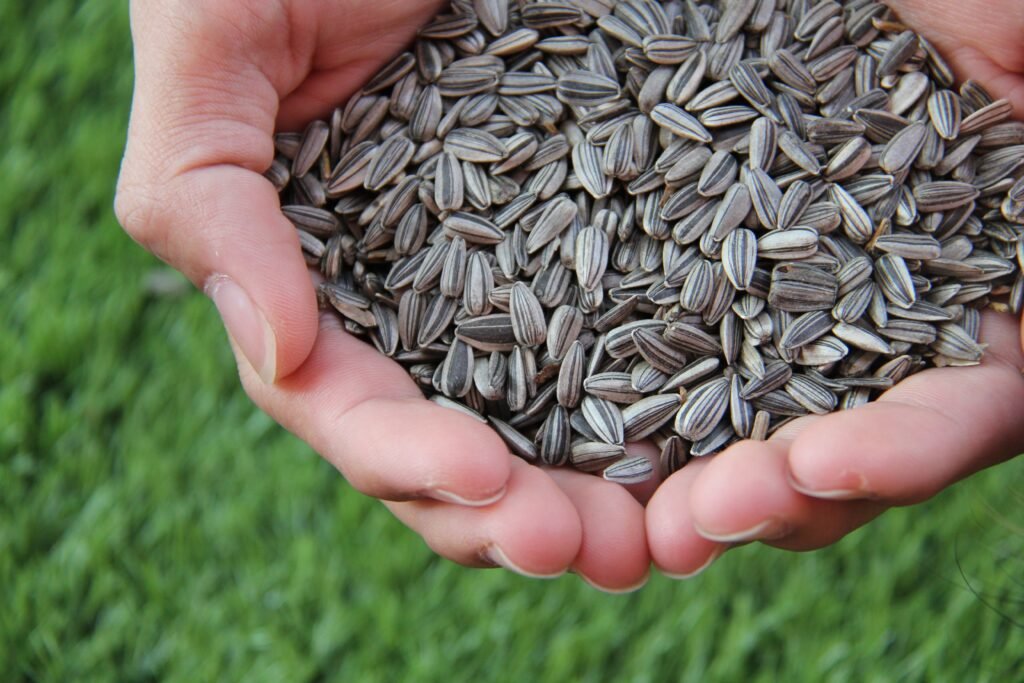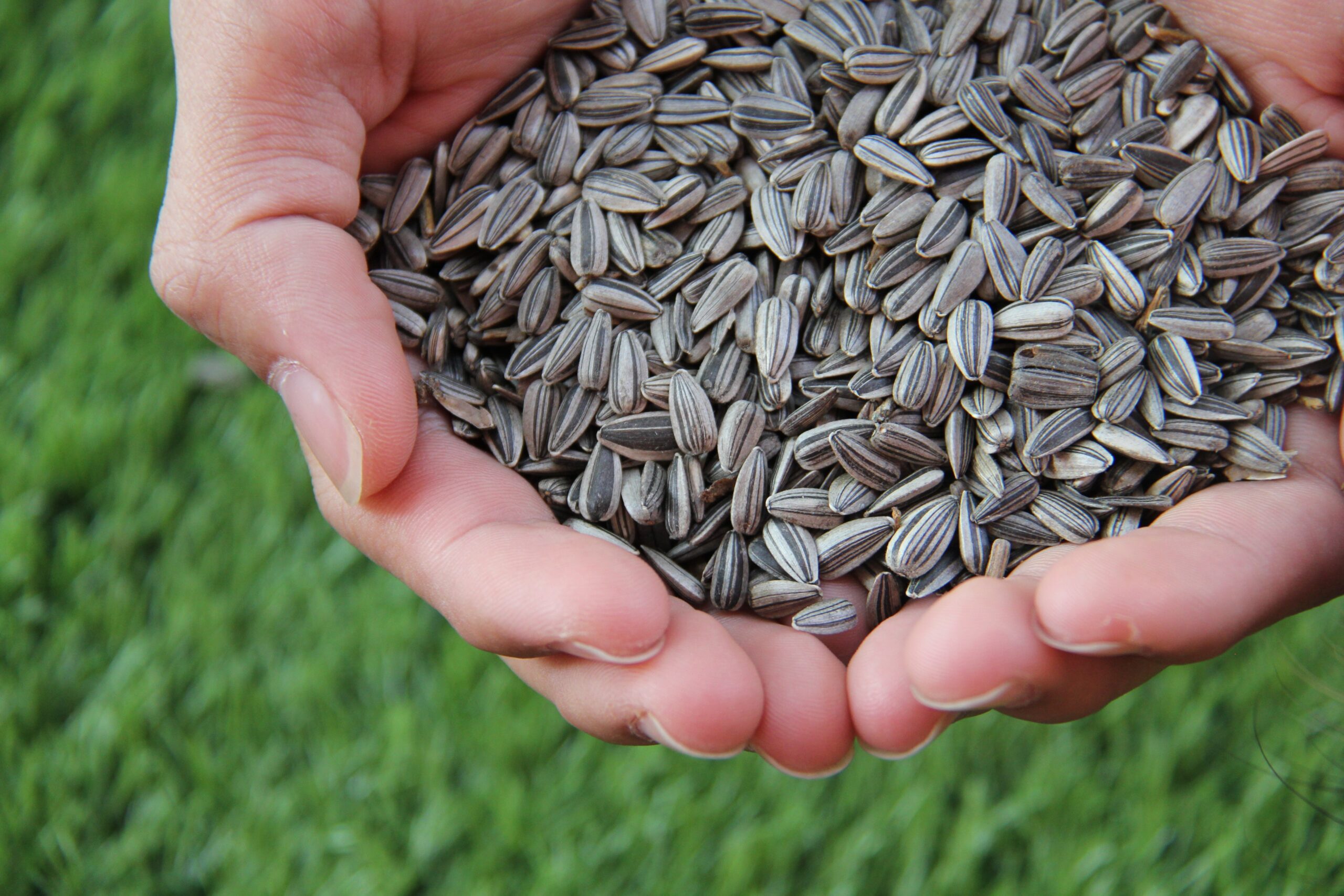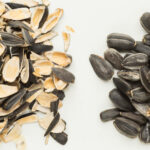
Overview
Sunflower seeds, the edible fruits of the sunflower plant (Helianthus annuus), have grown in popularity as a nutritious snack and food ingredient. These small seeds are packed with essential nutrients, healthy fats, and antioxidants that offer a wide range of health benefits. As more people seek natural ways to support their health, sunflower seeds have become a go-to food for their versatility, taste, and nutritional power.
In this article, we’ll explore the nutritional profile of sunflower seeds, examine their health benefits, compare them to other popular seeds, discuss potential risks, and offer tips on how to include them in your daily diet. Let’s dig into why sunflower seeds are good for you and how to make the most of them
Table of Contents
What Are Sunflower Seeds?
Sunflower seeds are the tiny, nutrient-rich seeds produced by the sunflower plant. These seeds are housed within the plant’s large, central flower head, which can produce thousands of seeds per plant. Sunflower seeds come in two main varieties:
- Oilseed Sunflower Seeds: Small and typically black, these seeds are primarily grown for their oil, which is extracted and used in cooking and various food products.
- Non-Oilseed (Confectionery) Sunflower Seeds: Larger seeds with a gray or black and white striped shell, these are the type often eaten as a snack or used in recipes
Related : Medications You Should Never Mix With Coffee
Sunflower seeds are sold with or without their shells. When the outer shell is removed, the edible inner part, or “kernel,” is revealed. These kernels are nutrient-dense and offer a mild, nutty flavor that pairs well with both savory and sweet foods.
Nutritional of Sunflower Seeds
A small serving of sunflower seeds packs a powerful nutritional punch. Here is the typical nutritional breakdown of a 1-ounce (28-gram) serving of shelled, dry-roasted sunflower seeds
- Calories: 164
- Protein: 5.5 grams
- Fat: 14 grams (mostly unsaturated fats)
- Carbohydrates: 6.5 grams
- Fiber: 3 grams
- Vitamin E: 37% of the Daily Value (DV)
- Magnesium: 9% of the DV
- Selenium: 32% of the DV
- Vitamin B6: 11% of the DV
- Folate: 17% of the DV
- Phosphorus: 26% of the DV
- Iron: 6% of the DV
This rich profile means that sunflower seeds provide a balanced combination of healthy fats, protein, and carbohydrates, along with key vitamins and minerals. Notably, they are high in antioxidants, including vitamin E and selenium, which protect cells from oxidative damage
Health Benefits of Sunflower Seeds
Heart Health
Sunflower seeds are rich in unsaturated fats, particularly linoleic acid, which is essential for maintaining heart health. Studies show that linoleic acid helps reduce cholesterol levels and lower blood pressure. Sunflower seeds also contain magnesium and potassium, which contribute to vascular health and support normal blood pressure levels. Consuming sunflower seeds in moderation as part of a balanced diet may improve cardiovascular health and reduce the risk of heart disease.
Immune Support
Vitamin E, zinc, and selenium in sunflower seeds are vital for a robust immune system. Vitamin E acts as a potent antioxidant, protecting cells from free radical damage, while selenium and zinc support immune cell function and help the body combat infection. Regular consumption of sunflower seeds can provide a natural immune boost, helping to prevent common illnesses and support overall health
Related : Signs and symptoms of gum cancer
Skin Health
The high levels of vitamin E in sunflower seeds make them excellent for skin health. Vitamin E promotes skin repair, helps reduce inflammation, and protects the skin from sun damage and premature aging. Additionally, the fatty acids in sunflower seeds help maintain skin elasticity and hydration. Including sunflower seeds in your diet can contribute to a healthy, glowing complexion.
Bone Health
Magnesium, phosphorus, and copper in sunflower seeds play an essential role in bone health. Magnesium helps regulate calcium levels in the body, contributing to bone density, while phosphorus is crucial for strong bones and teeth. Copper aids in collagen formation, supporting bone and connective tissue strength. Together, these nutrients make sunflower seeds an excellent choice for maintaining bone health as you age.
Blood Sugar Management

Sunflower seeds have a low glycemic index and are rich in fiber, which helps slow down sugar absorption into the bloodstream. The magnesium in sunflower seeds has also been shown to improve insulin sensitivity, making them beneficial for people managing blood sugar levels or those at risk of type 2 diabetes. Eating sunflower seeds as a snack or adding them to meals can help support healthy blood sugar levels.
Sunflower Seeds vs. Other Seeds
Related : Foods to Eat When You Have the Flu
Sunflower seeds share the spotlight with other popular seeds, such as chia, flax, and pumpkin seeds. Here’s how they compare in terms of nutrition and benefits
Calories
- Sunflower Seeds: Moderate
- Chia Seeds: Low
- Flaxseeds: Moderate
- Pumpkin Seeds: Moderate
Protein
- Sunflower Seeds: Moderate
- Chia Seeds: Moderate
- Flaxseeds: Low
- Pumpkin Seeds: High
Omega-3 Fatty Acids
- Sunflower Seeds: Low
- Chia Seeds: High
- Flaxseeds: High
- Pumpkin Seeds: Low
Fiber
- Sunflower Seeds: Moderate
- Chia Seeds: High
- Flaxseeds: High
- Pumpkin Seeds: Moderate
Notable Nutrients
- Sunflower Seeds: Vitamin E, Selenium, Magnesium
- Chia Seeds: Omega-3s, Fiber
- Flaxseeds: Omega-3s, Fiber, Lignans
- Pumpkin Seeds: Magnesium, Zinc, Protein
Best For
- Sunflower Seeds: Heart health, immunity, skin
- Chia Seeds: Heart health, digestion
- Flaxseeds: Digestion, hormone balance
- Pumpkin Seeds: Muscle health, immune support
Related : 10 Health Benefits of Coffee and Tea
Sunflower seeds provide a unique nutrient profile with high vitamin E and selenium content, which many other seeds lack. They’re an excellent addition to a balanced diet, complementing the nutritional benefits of other seeds.
Potential Risks and Considerations
- While sunflower seeds are nutritious, there are a few potential risks to keep in mind:
- High-Calorie Content: Sunflower seeds are calorie-dense, so consuming them in large amounts may lead to weight gain if they are not balanced with other foods.
- Sodium in Packaged Seeds: Many sunflower seeds are sold salted, which can increase sodium intake and potentially elevate blood pressure. Opt for unsalted or lightly salted versions if you’re watching your sodium levels.
- Cadmium Exposure: Sunflower plants are known to absorb cadmium from the soil, a heavy metal that can accumulate in the body over time. While moderate consumption is unlikely to pose a significant risk, it’s wise to avoid excessive intake.
How to Add Sunflower Seeds to Your Diet
Incorporating sunflower seeds into your meals is easy and can add texture and flavor to a wide range of dishes. Here are a few ideas:
- Salad Topping: Sprinkle sunflower seeds over salads to add crunch.
- Smoothies: Blend a tablespoon of sunflower seeds into your smoothie for added protein and healthy fats.
- Trail Mix: Combine sunflower seeds with other nuts and dried fruits for a nutritious snack.
- Baked Goods: Add sunflower seeds to bread, muffins, or granola bars.
- Yogurt or Oatmeal: Stir sunflower seeds into yogurt or oatmeal for a hearty breakfast.
Easy Recipes Featuring Sunflower Seeds
Sunflower Seed Pesto
Ingredients
- 1 cup fresh basil leaves
- 1/4 cup sunflower seeds (unsalted)
- 1/4 cup grated Parmesan cheese
- 1 clove garlic
- 1/4 cup olive oil
- Salt and pepper to taste
Instructions
- In a food processor, blend basil, sunflower seeds, Parmesan, and garlic.
- Slowly add olive oil until you reach a smooth consistency.
- Season with salt and pepper.
- Serve with pasta or use as a spread on sandwiches.
Sunflower Seed Energy Bites
Ingredients
- 1 cup oats
- 1/2 cup sunflower seeds
- 1/2 cup almond butter
- 1/4 cup honey
- 1/4 cup dark chocolate chips (optional)
Instructions
- Mix all ingredients in a bowl until well combined.
- Roll mixture into small balls.
- Refrigerate for 30 minutes before serving
The Takeaway
Sunflower seeds offer numerous health benefits thanks to their impressive nutrient profile, providing essential vitamins, minerals, healthy fats, and protein. From supporting heart health and the immune system to promoting glowing skin and strong bones, these seeds are a versatile and nutritious addition to any diet. However, moderation is key due to their calorie density
FAQs About Sunflower Seeds and Their Benefits
Are sunflower seeds good for weight loss?
Yes, sunflower seeds can be beneficial for weight loss when eaten in moderation. They are rich in fiber, which helps promote satiety, and they contain healthy fats and protein that provide sustained energy. However, due to their calorie density, it’s best to consume them in controlled portions.
Can eating sunflower seeds improve skin health?
Absolutely! Sunflower seeds are a great source of vitamin E, a powerful antioxidant that helps protect skin cells from damage, supports skin hydration, and can improve overall skin appearance. They also contain zinc and selenium, which are beneficial for skin health.
Are sunflower seeds a good source of protein for vegetarians?
Yes, sunflower seeds offer a moderate amount of plant-based protein, making them a good option for vegetarians looking to boost their protein intake. They can be eaten as a snack, added to salads, or included in various recipes to enhance the protein content.
How should sunflower seeds be stored to maintain freshness?
To keep sunflower seeds fresh, store them in an airtight container in a cool, dry place. For long-term storage, keeping them in the refrigerator or freezer can help prevent rancidity, as the oils in the seeds can spoil if exposed to warm temperatures for extended periods.












